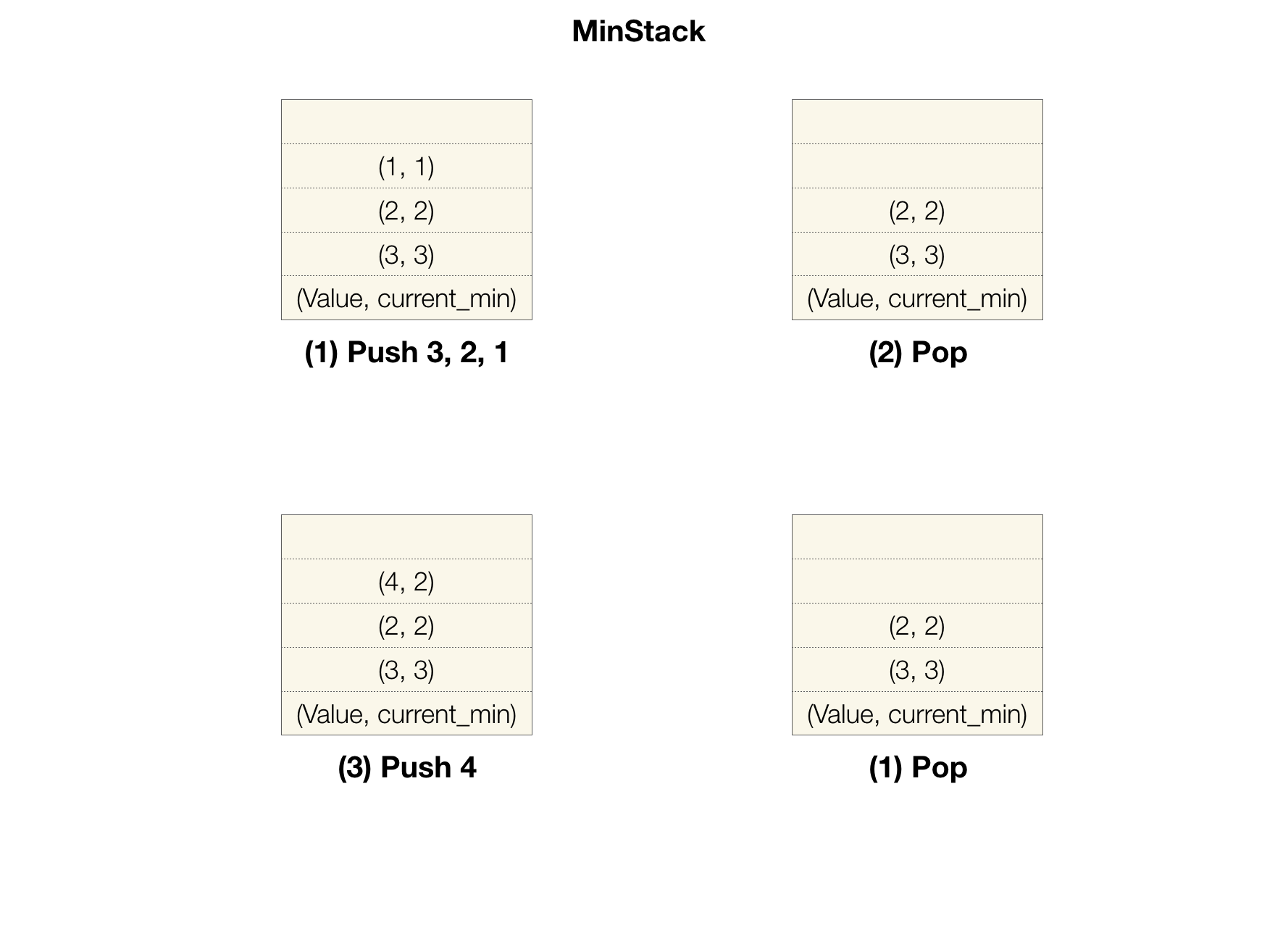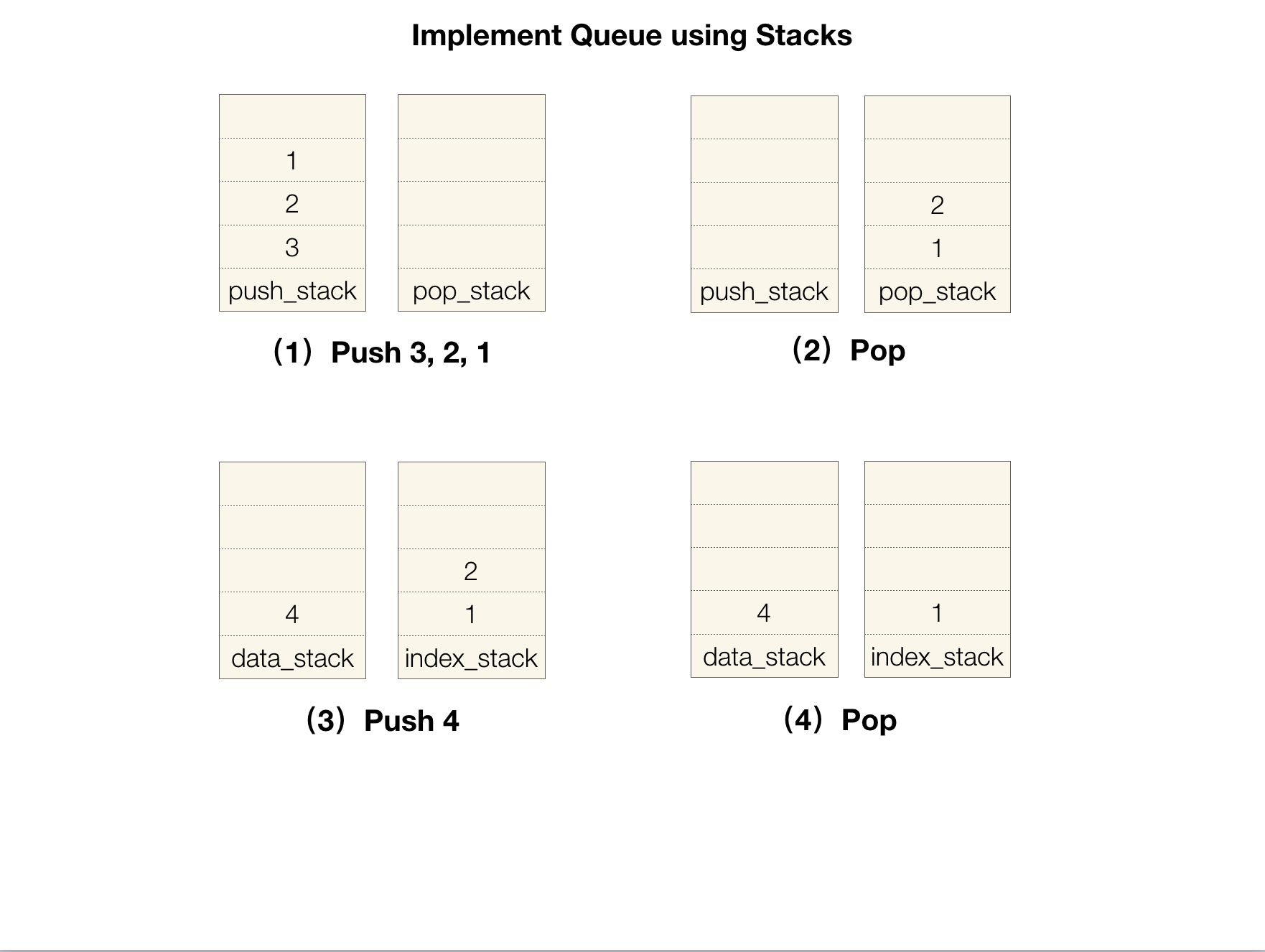LeetCode上有两道关于Stack的题目:
其中MinStack有个变体题目是MinQueue,简单地来说就是要实现Queue的常用操作,并使获取Queue中的最小值操作所需的时间复杂度为常数。
由于直接套MinStack的Solution在MinQueue上是行不通的,因此可以先实现MinStack,再用MinStack实现Queue。
MinStack
Problem Description
Design a stack that supports push, pop, top, and retrieving the minimum element in constant time.
- push(x) – Push element x onto stack.
- pop() – Removes the element on top of the stack.
- top() – Get the top element.
- getMin() – Retrieve the minimum element in the stack.
Solution
解法有两种,但是核心思想都是利用空间换时间。
Solution A
在原有的栈的基础上,再维护一个存放最小值索引的栈。
For Example:

Talk is cheap, show code.
class MinStack(object):
def __init__(self):
self.index_stack = []
self.data_stack = []
def pop(self):
"""
判断出栈值是否为最小索引栈的top值,如果是,最小索引栈也执行pop操作
:return:
"""
o = self.data_stack[-1]
if o == self.data_stack[self.index_stack[-1]]:
self.index_stack.pop()
return self.data_stack.pop()
def push(self, o):
"""
判断入栈值是否比最小索引栈的top值小,如果是,入栈值的索引入栈
:param o: 入栈值
:return:
"""
index = None
if not self.index_stack:
index = 0
elif o <= self.data_stack[self.index_stack[-1]]:
index = len(self.data_stack)
if index is not None:
self.index_stack.append(index)
self.data_stack.append(o)
def top(self):
return self.data_stack[-1]
def getMin(self):
if not self.data_stack:
raise IndexError("get min from empty list")
index = self.index_stack[-1]
return self.data_stack[index]Solution B
利用链表的思想,入栈时同时保存当前最小值的信息。
For Example:

from collections import namedtuple
StackNode = namedtuple("StackNode", ["value", "curr_min"])
class MinStack(object):
def __init__(self):
self.data_stack = []
def pop(self):
return self.data_stack.pop().value
def push(self, o):
"""
当前栈的top值小于入栈值时,即将入栈的最小值才为上一个最小值,否则为
入栈值(包括栈中没有元素以及,入栈值大于上一个最小值的情况)
:param o: 入栈值
:return:
"""
min_value = o
if self.data_stack and o > self.getMin():
min_value = self.getMin()
self.data_stack.append(StackNode(value=o, curr_min=min_value))
def top(self):
return self.data_stack[-1].value
def getMin(self):
return self.data_stack[-1].curr_minImplement Queue using Stacks
Problem Description
Implement the following operations of a stack using queues.
- push(x) – Push element x onto stack.
- pop() – Removes the element on top of the stack.
- top() – Get the top element.
- empty() – Return whether the stack is empty.
Solution
通过两个栈来实现一个队列,push_stack执行队列的入队操作,pop_stack执行队列的出队操作。
当执行入队操作的时候,push_stack可以视为LIFO顺序;当执行出队操作的时候,需要将push_stack中的元素弹出,并push进pop_stack,此时pop_stack中的元素出栈顺序就可以视为是正常队列的FIFO顺序。
For Example:

class MockQueue(object):
def __init__(self):
self.push_stack = []
self.pop_stack = []
def _clear_push_stack(self):
while self.push_stack:
self.pop_stack.append(self.push_stack.pop())
def push(self, o):
self.push_stack.append(o)
def pop(self):
if not self.pop_stack:
self._clear_push_stack()
return self.pop_stack.pop()
def peek(self):
if not self.pop_stack:
self._clear_push_stack()
return self.pop_stack[-1]
def empty(self):
return not bool(self.push_stack or self.pop_stack)注意pop操作只有在pop_stack为空的情况下才需要clear_push_stack。
MinQueue
题目的要求之前已经说的很清楚了,直接上代码。
# implement queue using stacks + min stack = min queue
class MinQueue(object):
def __init__(self):
self.push_stack = MinStack()
self.pop_stack = MinStack()
def _clear_push_stack(self):
while not self.push_stack.empty():
self.pop_stack.push(self.push_stack.pop())
def push(self, o):
self.push_stack.push(o)
def pop(self):
if self.pop_stack.empty():
self._clear_push_stack()
return self.pop_stack.pop()
def peek(self):
if self.pop_stack.empty():
self._clear_push_stack()
return self.pop_stack.top()
def empty(self):
return self.push_stack.empty() and self.pop_stack.empty()
def getMin(self):
return min([self.push_stack.getMin(), self.pop_stack.getMin()])







 本文介绍了如何使用栈实现两个LeetCode题目:MinStack和Implement Queue using Stacks,并讨论了如何结合这两个解决方案来创建一个在常数时间内获取最小值的MinQueue。在MinStack中,通过额外的栈保存最小值的索引或信息,而在Implement Queue using Stacks中,通过两个栈模拟队列的FIFO操作。
本文介绍了如何使用栈实现两个LeetCode题目:MinStack和Implement Queue using Stacks,并讨论了如何结合这两个解决方案来创建一个在常数时间内获取最小值的MinQueue。在MinStack中,通过额外的栈保存最小值的索引或信息,而在Implement Queue using Stacks中,通过两个栈模拟队列的FIFO操作。
















 785
785

 被折叠的 条评论
为什么被折叠?
被折叠的 条评论
为什么被折叠?








